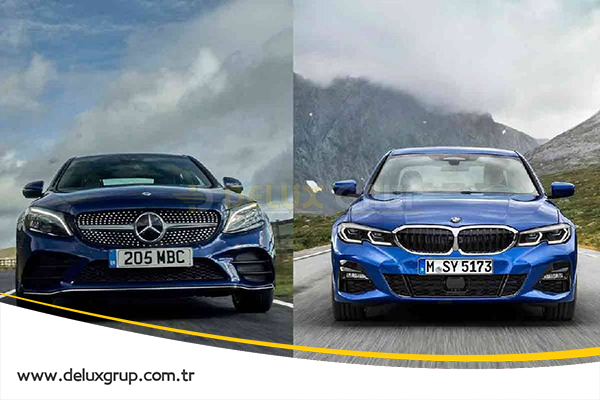
The competition between Mercedes-Benz and BMW is one of the most well-known and enduring rivalries in the automotive industry. These two German giants have been competing for more than a century, each striving to outdo the other in terms of innovation, performance, luxury, and brand prestige. Here’s an overview of their rivalry:
Historical Background
- Mercedes-Benz was founded in 1926, though its origins trace back to the first automobile created by Karl Benz in 1886. It has long been associated with luxury, engineering excellence, and innovation.
- BMW (Bayerische Motoren Werke) , founded in 1916, initially focused on aircraft engines before shifting to motorcycles and automobiles. Over the years, BMW built a reputation for producing sporty, driver-focused vehicles with a strong emphasis on performance.
Innovation and Technology
- Mercedes-Benz : Known for its pioneering spirit, Mercedes-Benz has introduced many technological innovations to the market, including the first production automobile, the first safety airbag, and advanced driver assistance systems. The brand’s focus has traditionally been on luxury, safety, and comfort.
- BMW : While BMW has also been a leader in automotive technology, its focus has been more on delivering an engaging driving experience. BMW has introduced innovations such as advanced inline-six engines, rear-wheel-drive architecture, and dynamic driving systems. The brand’s tagline, “The Ultimate Driving Machine,” underscores its commitment to performance and driving pleasure.
Product Range and Market Segments
- Both companies offer a wide range of vehicles, from compact cars to high-end luxury sedans, SUVs, and sports cars. Mercedes-Benz is often seen as the benchmark for luxury in various segments, while BMW is viewed as the sportier option.
- SUVs : Both brands have a strong presence in the SUV market. Mercedes-Benz has models like the GLE and G-Class, which emphasize luxury and off-road capability. BMW’s X-Series (like the X5 and X7) focuses on blending performance with practicality.
- Sedans : In the luxury sedan segment, the competition is fierce. Mercedes-Benz’s S-Class is often considered the epitome of luxury sedans, while BMW’s 7 Series rivals it with a sportier edge. The E-Class (Mercedes) and 5 Series (BMW) are also major contenders in the executive sedan market.
- Performance Cars : BMW’s M division and Mercedes-AMG are the high-performance arms of the respective brands. The competition between the BMW M3 and the Mercedes-AMG C63 is legendary, with both offering thrilling performance but with different philosophies—BMW focusing on precision handling and Mercedes-AMG on brute power.
Brand Image and Identity
- Mercedes-Benz: The brand is often associated with luxury, prestige, and innovation. It appeals to a wide demographic, particularly those who value comfort, safety, and cutting-edge technology.
- BMW: BMW’s brand image is more aligned with driving enthusiasts who value performance and the sheer joy of driving. It appeals to those who seek a more dynamic and engaging driving experience, even in their daily commute.
Global Reach and Market Strategy
- Both brands have a global presence and cater to a wide range of customers. They have expanded their production facilities and sales networks worldwide, particularly in growing markets like China and the United States.
- Sustainability: In recent years, both BMW and Mercedes-Benz have made significant investments in electric vehicles (EVs) and sustainable technologies. BMW’s i Series (like the i3 and i8) and Mercedes-Benz’s EQ line (such as the EQS and EQC) represent their commitment to the future of mobility.
Sales and Financial Performance
- The rivalry extends to sales figures, where both brands are in a constant race to be the top-selling luxury automaker globally. This competition pushes both companies to continuously innovate and refine their offerings.
Cultural Impact
- The competition between Mercedes-Benz and BMW has also seeped into popular culture, with both brands being status symbols and often featured in movies, music videos, and celebrity endorsements. Their rivalry is not just about cars; it’s about the values and lifestyles they represent.
Conclusion
The competition between Mercedes-Benz and BMW is a driving force behind some of the most remarkable innovations and advancements in the automotive industry. Their rivalry has not only pushed the boundaries of what luxury and performance vehicles can offer but has also provided consumers with a diverse array of choices in the premium car market. Whether it’s the luxurious appeal of Mercedes-Benz or the sporty thrill of BMW, both brands continue to define and shape the future of the automobile industry.











